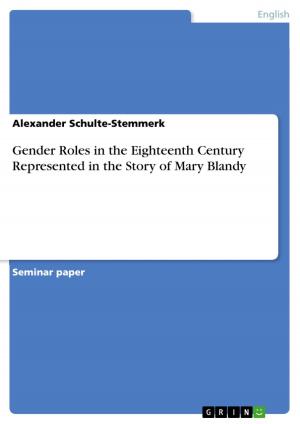How far should Greek Tragedy be regarded as a dangerous genre?
Nonfiction, Entertainment, Theatre, Performing Arts| Author: | Felicity Sanford | ISBN: | 9783640202379 |
| Publisher: | GRIN Publishing | Publication: | November 5, 2008 |
| Imprint: | GRIN Publishing | Language: | English |
| Author: | Felicity Sanford |
| ISBN: | 9783640202379 |
| Publisher: | GRIN Publishing |
| Publication: | November 5, 2008 |
| Imprint: | GRIN Publishing |
| Language: | English |
Essay from the year 2008 in the subject Theater Studies, Dance, grade: A, Bath Spa University (Bath Spa University), course: Tragedy Seminar, 7 entries in the bibliography, language: English, abstract: When debating how dangerous the moral and social issues of a typical Ancient Greek play may be to an audience, it is imperative that the discussion includes comparisons between its effects on the original audience and on a contemporary audience. The focus of this debate is the issue of incest, which is a key component in typical Ancient Greek plays and a major topic regarding morality. The issue of related persons sharing sexual experiences has been debated since the BC age. When discussing this ethical issue it is necessary to observe that the moral implications of the plays inner meaning may affect its audiences through the ages in different degrees, depending on the social decorum of the time. A general example, Ellen Pollak (2003) has acknowledged incestuous relations within English novels that appeared between the late seventeenth and the early nineteenth century. A contemporary society finds this surprising due to this period of time's identification as an era of sexual repression and the emphasis on strict protocol and etiquette. I wish to uncover how far the two renowned Greek plays, Euripides' Hippolytus and Sophocles' Oedipus Rex, were treated as plays with delicate central subjects, what were the aims of the playwrights for writing about such moral matters and if the authorities of the time were worried about its effect on the masses. The portrayal of incest within a play also is debated because Greek plays did not show action on the stage but had a smaller role to describe to the Chorus, who acted as the voice of the spectators, what the off-stage action entailed. With this detached style of playwriting, how far can one presume that incest is a dangerous subject for an audience to watch? In Oedipus Rex (1998), the audience is exposed to many taboo subjects. For example, there are elements of death, suicide, murder, violence, starvation alongside a more physical set of taboo ingredients such as blood, fluids, poison, burning incense, pus and disease. Because of these components, the play is a gruesome account of a historical event. Sophocles adapted his play from an already existent and well-known story. With this in mind, the audience would already know the denouement of the story and would be spectators of the way the ending was procured. (...)
Essay from the year 2008 in the subject Theater Studies, Dance, grade: A, Bath Spa University (Bath Spa University), course: Tragedy Seminar, 7 entries in the bibliography, language: English, abstract: When debating how dangerous the moral and social issues of a typical Ancient Greek play may be to an audience, it is imperative that the discussion includes comparisons between its effects on the original audience and on a contemporary audience. The focus of this debate is the issue of incest, which is a key component in typical Ancient Greek plays and a major topic regarding morality. The issue of related persons sharing sexual experiences has been debated since the BC age. When discussing this ethical issue it is necessary to observe that the moral implications of the plays inner meaning may affect its audiences through the ages in different degrees, depending on the social decorum of the time. A general example, Ellen Pollak (2003) has acknowledged incestuous relations within English novels that appeared between the late seventeenth and the early nineteenth century. A contemporary society finds this surprising due to this period of time's identification as an era of sexual repression and the emphasis on strict protocol and etiquette. I wish to uncover how far the two renowned Greek plays, Euripides' Hippolytus and Sophocles' Oedipus Rex, were treated as plays with delicate central subjects, what were the aims of the playwrights for writing about such moral matters and if the authorities of the time were worried about its effect on the masses. The portrayal of incest within a play also is debated because Greek plays did not show action on the stage but had a smaller role to describe to the Chorus, who acted as the voice of the spectators, what the off-stage action entailed. With this detached style of playwriting, how far can one presume that incest is a dangerous subject for an audience to watch? In Oedipus Rex (1998), the audience is exposed to many taboo subjects. For example, there are elements of death, suicide, murder, violence, starvation alongside a more physical set of taboo ingredients such as blood, fluids, poison, burning incense, pus and disease. Because of these components, the play is a gruesome account of a historical event. Sophocles adapted his play from an already existent and well-known story. With this in mind, the audience would already know the denouement of the story and would be spectators of the way the ending was procured. (...)















